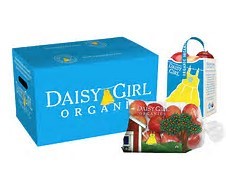OPN: When did CMI launch its organic apple program?
CMI Orchards has had an organic apple and pear program for many, many years. In 2012, the team concluded that there was an opportunity to be more assertive in branding our organic apples and pears to better connect with consumers. At that point, the Daisy Girl brand was developed and launched. What originally started as an organic program for bulk apples and pears has been expanded to include packaged products as well as premium branded organic apples like KIKU, Kanzi and Ambrosia.
OPN: Did it progress the way it was plotted out on the drawing board?
There are always unexpected challenges, but the Daisy Girl organics program has been surprising people since the brand was launched. When we launched Daisy Girl, the prevailing wisdom was organic brands should appear “earthy”, completely muted, using predominantly dark colors in branding, logos and packaging. In the development of Daisy Girl, we rejected that thinking and instead applied strong branding and packaging principles. Bright, vibrant blues and yellows were used in the branding. Strong imagery was created in the Daisy Girl logo. And high-end two pound pouch packaging was designed to capture the attention and imagination of consumers. I think the breakthrough was the realization that the dedicated, organic-only shopper represents a relatively small sub-set of potential shoppers in supermarkets. The much larger target market for Daisy Girl are the emerging organic shoppers who actively move in and out of organic produce purchases based on perceptions of product quality, price, and branding, much as they do with traditional produce purchases. This consumer is interested in buying organics, but they are also receptive to traditional branding and packaging, as long as the organic messaging and product quality are right.
OPN: Do organic apples have to bring a premium price?

Our input costs to grow organic apples are higher than for conventional apples. So just the cost inputs make the product more expensive to grow. Second, yields are typically lower. So, there is less fruit produced per acre. Those higher costs and lower yields are passed on to retailers in the form of higher FOB pricing…which in turn necessitates higher shelf prices for consumers.
The interesting piece is we have found that organic consumers tend to be less price sensitive and are willing to pay for unique, higher quality items. This has allowed us to be quite successful in selling our premium branded apples as super-premium organic branded apples. We’re effectively working with our retail partners to create price tiers within the organic apple mix.
OPN: At this point what percentage of your production is organic vs. conventional?
Today, at CMI Orchards about 22% of our total production is organic. Our organic production is growing as is our total production. We anticipate that within four years our organic production will shift up to approximately 25% of total production. That doesn’t sound like a big increase, but it’s a larger share of a much larger overall production base.
OPN: What is CMI’s merchandising philosophy at retail?
We think every organic and conventional item needs to have sufficient velocity to justify its place on the retail shelf. So it’s not so much a question of only carrying conventional or organics in certain varieties as much as looking at the consumer demand for specific varieties, the availability of organic options and using that to develop a shelf plan that maximizes performance. We never view certain varieties of organic apples as a pure substitute for the conventional item. It really comes down to developing a plan to maximize overall apple category performance by creating the best consumer offering. Within the constraints of shelf space, the goal is to create a product mix that drives optimal dollars and volume for the category. For some retailers that means cutting back to a single SKU of certain lower-performing varieties, either conventional or organic, but not both. For popular varieties, the smart move is to continue to offer both simply because the sales velocity will be higher than any substitute that might be brought in.
Going forward, as the quality and supply continuity of organic apples continues to improve, we do expect that more retailers—particularly those with limited shelf space--will be able to be more aggressive in eliminating varietal duplication between organics and conventional.






